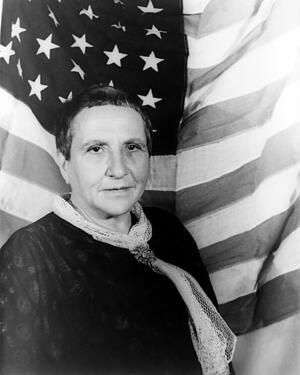Death of Gertrude Stein
The American modernist writer Gertrude Stein died on July 27, 1946, at the American Hospital at Neuilly-sur-Seine, France. Stein was an international celebrity, while remaining an artistic iconoclast. She also nourished scores of other writers, artists, and musicians in her salon in Paris.
As Linda Simon writes in her biography of Stein in Jewish Women: A Comprehensive Historical Encyclopedia, “Stein sought in Paris a liberation from the strictures of American society that made her feel like an outcast. In a community of artists and writers who were trying to invent a new language in painting, poetry, and prose, Stein was able to create her own identity as a literary pioneer. In a community that accepted and even affirmed a wide range of sexual identities, Stein did not need to fear censure.”
She experimented with a unique approach to language and repetition, often utilizing the technique she called the “continuous present” to explore the “bottom nature” of her friends, family, and herself. Her most famous works are the memoir The Autobiography of Alice B. Toklas and the opera The Mother of Us All, which celebrates the life and work of Susan B. Anthony. Her determination to express herself through constant innovation and to support and encourage a community of like-minded artists is her legacy to the creative spirit.




Another, less pleasant view of GS: a Vichy supporter and helper. see: "Unlikely Collaboration: Gertrude Stein, Bernard Fay and the Vichy Dilemma" by Barbara Will (2011). GS and Alice b Toklas--women, Jews, Lesbians--survived in a lovely cottage in S France. How? read this book
Stein was a translator for the Vichy regime in France during the war, and tried continually to get the Nazi speeches aired on American radio. She spoke in favor of Hitler, and was hence protected by the Vichy authorities.